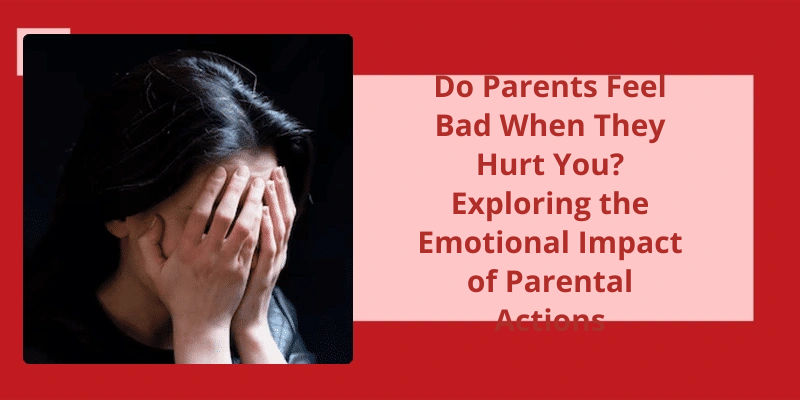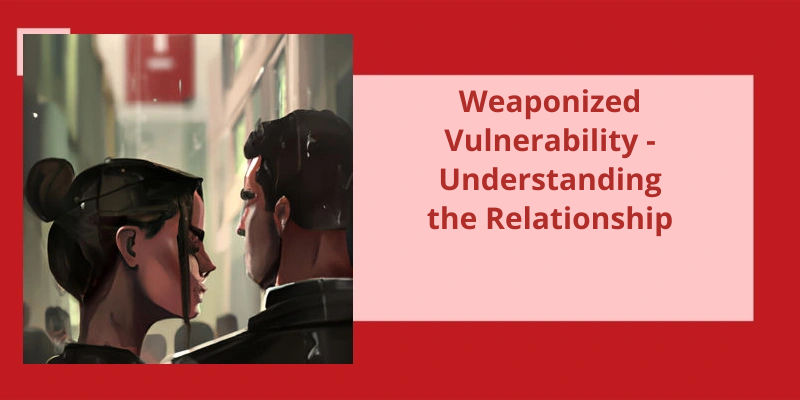The relationship between parents and their children is one of the most complex and critical ones in one's life. While most parents strive to raise their children with love and compassion, misunderstandings and conflicts are bound to arise at some point. When parents hurt their children, whether intentionally or unintentionally, it can have a lasting impact on both parties. But how do parents feel when they hurt their children? Is it just as painful and distressing for them, or do they brush off their actions as necessary tough love? The answer to this question is multifaceted and varies from parent to parent based on their upbringing, cultural background, and personal values.
Why Do Kids Say Hurtful Things to Parents?
Children get overwhelmed by their emotions, and they lack the ability to regulate or understand them fully. As a result, they can end up saying some hurtful things in the heat of the moment. This doesn’t necessarily mean that they don’t love or respect their parents, but rather that they’re struggling to cope with their feelings.
In some cases, children may be acting out of fear or anxiety. If they feel threatened or unsafe in their environment, they may lash out at their parents as a way of attempting to regain control or protect themselves. This can be particularly true for kids who’ve experienced trauma or abuse.
Gender roles and societal expectations may also play a role in childrens behavior towards their parents. Boys, in particular, are often socialized to be more aggressive and competitive than girls. They may be more likely to engage in verbal sparring with parents as a way of asserting their independence or proving their toughness.
One way to do this is by modeling healthy communication skills and validating childrens feelings, even when you don’t agree with them. When kids feel heard and understood, they’re less likely to resort to hurtful language as a way of expressing themselves. It’s also important to set clear boundaries around what kind of language is acceptable in your household and to enforce consequences when those boundaries are crossed. By doing so, you can help your child develop more respectful and effective communication skills over time.
Emotions are an essential part of the human experience and expressing them is a healthy way to cope with different situations. Crying is one such basic response to intense emotions, and it can be triggered by various factors. It isn’t unusual for people to cry because of their parents, and it can mean different things depending on the context. However, it’s essential to remember that expressing emotions is a normal and healthy way to deal with different experiences.
Is It Normal to Cry Because of Your Parents?
Crying is a natural expression of emotions, and it’s common to cry when experiencing intense feelings such as grief, sadness, or frustration. Many individuals may find themselves crying when thinking about their parents, especially if their relationship with them is complex or fraught with conflict. It’s a natural response to the deep feelings and emotions that influence our experiences with our parents.
Often, our parents play a central role in shaping our experiences of the world and our sense of self. If we’ve experienced trauma, abuse or neglect at the hands of our parents, we may still feel pain and sorrow long after they’re gone.
Whether we cry out of sadness, joy, or gratitude, these emotions are an integral part of our human experience and represent a deep connection to those who’ve played a central role in our lives. Regardless of the reasons for our tears, it’s important to acknowledge and honor them as part of our emotional journey.
It’s fascinating to explore the emotional development of children and how they respond to pain. Recent studies have suggested that even very young children have a basic understanding of the concept of pain and are capable of empathizing with others who’re suffering. This has important implications for how we approach parenting and childcare, as well as for our understanding of how empathy develops over time.
At What Age Do Children Understand Pain?
This early understanding of pain may be related to the development of empathy, which is the ability to recognize and respond to the emotions of others. Empathy is thought to emerge gradually over the first few years of life and is related to the development of various cognitive and social abilities. For example, infants ability to imitate others appears to be related to their understanding of others emotions and intentions [3].
As children get older, their understanding of pain becomes more sophisticated. By the age of 3 or 4, children can differentiate between physical pain and emotional distress [4]. This means that they understand that there are different types of pain and that not all hurts can be seen. For example, they may understand that someone who’s crying is sad, but they may not understand why the person is sad.
This means that they can imagine how someone else might feel in a particular situation and respond accordingly [5]. For example, they may understand that someone who’s lost a toy is upset and offer to help find it or share one of their own toys.
Source: The Perception and Estimation of Others’ Pain according to …
Parenting comes with it’s own set of joys and challenges. While raising a child, it’s common to question yourself and wonder if you’re doing everything right. The feeling of guilt can creep in, making you doubt your abilities as a parent. However, it’s important to remember that parenting is a never-ending journey, and it’s okay to admit when it gets tough. Let’s explore more about why parents feel guilty and how to cope with it.
Is It Normal to Feel Guilty as a Parent?
However, feeling guilty as a parent can be an overwhelming experience. It’s natural for parents to worry if theyre doing everything right, especially when it comes to their childrens emotional and behavioral development. But, constantly beating yourself up for not being a perfect parent isnt healthy for you or your children.
Many parents often compare themselves to other parents, and this can add to their sense of guilt and inadequacy. It’s important to remember that everyones parenting journey is different. What may work for one family may not work for another. Instead of judging yourself, focus on what youre doing well. This will help you build your confidence as a parent and set a good example for your children.
Another factor that can contribute to parental guilt is the endless stream of advice and opinions that are available online and from other parents. In a world where information is so readily accessible, it’s easy to become overwhelmed and second-guess yourself as a parent. However, it’s important to remember that not all advice is good advice, and what works for one family may not work for another. Always trust your instincts and remember that you know your child better than anyone else.
Sometimes, the guilt we feel as parents isn’t related to our parenting skills but rather our own personal issues. It’s important to take care of ourselves both physically and mentally, so we can be the best version of ourselves for our children. All parents need some time-out to recharge their batteries, so don’t feel guilty about taking some time for yourself.
It’s important to remember that perfection is unattainable, and we all make mistakes. Instead of focusing on our flaws, we need to celebrate our successes and learn from our mistakes. Trust yourself as a parent and know that youre doing the best you can for your children.
The subject of empathy has long been a topic of interest among researchers. Studies have shown that adults are wired to feel the pain of others, but what about children? A recent study suggests that even young children have an innate ability to understand and feel the pain of others. This finding could have far-reaching implications for how we understand empathy and how we can foster it in future generations.
Can a Child Feel Their Parents Pain?
It’s been long debated whether a child can feel their parents pain. Some argue that children lack the emotional capacity to understand and empathize with their parents emotions. However, recent research suggests otherwise. Scientists have discovered that childrens brains react similarly to adults when they witness someone in pain, indicating that empathy may be inherently present in the human brain.
The study, which was conducted by researchers at the University of Colorado, Boulder, involved 18 children between the ages of 4 and The children were shown videos of people who were experiencing either physical pain, such as being pricked with a needle, or emotional pain, like being socially excluded. While watching these videos, the childrens brains were monitored using functional MRI (fMRI) scans. The results showed that the same parts of the brain that light up in adults when they see someone in pain also lit up in the children.
Interestingly, the study also revealed that children seem to be more attuned to emotional pain than physical pain. When watching videos of someone being excluded from a group, the childrens brains showed more activity than when watching someone experience physical pain. This suggests that children may be more in tune with social and emotional cues than adults give them credit for.
The findings of this study have important implications for our understanding of human empathy and the development of social behavior. If empathy is truly innate, it suggests that it’s a fundamental part of our humanity that’s present from an early age. This may have implications for how we approach parenting and education, as nurturing childrens innate empathy may be key to fostering healthy social relationships.
This has implication for our understanding of social behavior and parenting practices.
Navigating complex familial relationships can be emotionally taxing, particularly when parents say hurtful things. In these situations, it’s important to stay grounded and react in a healthy, constructive manner. The following tips offer guidance on how to respond when your mother says something hurtful and how to build healthy boundaries moving forward.
What to Do When Your Parents Hurt You Emotionally?
Growing up is challenging, and one of the most difficult parts of that journey is dealing with emotional turmoil from your parents. It can be especially difficult when your mother says hurtful things. You might feel helpless, or even as if you’re not good enough. However, there are ways to handle the situation and take control of your emotions.
The first thing to remember is to stay calm. It’s vital that you don’t react in the heat of the moment. If you react impulsively, you may say something you regret later or get into an argument that makes the situation worse. Taking a deep breath, or even walking away for a few minutes to clear your thoughts, can make all the difference.
It’s also crucial to think about why your mom said those things. Often, our parents say things out of their own fears and insecurities, rather than because they’re intentionally trying to hurt us. This doesn’t excuse any hurtful words, but it can help you understand that it’s not always about you. Understanding that can stop you from taking things personally.
Once you”ve taken a moment to process your feelings, tell your mom that she hurt your feelings. Be clear but calm in your communication, and don’t place blame or engage in an argument. Let her know how you feel, and let her know what you need from her in the future.
Setting healthy boundaries with your mom is also important. This may mean limiting contact with her or politely declining her invitations under certain circumstances. Boundaries don’t have to be harsh, but they’re necessary for your emotional well-being.
In addition to setting boundaries, developing a positive mindset is a powerful way to cope with negative thoughts and feelings. Focus on the things that make you happy and bring joy into your life, and let go of the things that bring you down.
Ultimately, prioritizing self-care is essential when dealing with emotional pain. This means taking the time to care for yourself physically, mentally, and emotionally. Turn to activities that bring you calm, like reading a book, taking a walk, or pursuing a hobby. When you’re feeling strong and grounded, it’s easier to cope with hurtful remarks from others, including your mom.
Conclusion
In conclusion, the topic of how parents feel when they hurt their children is complex and nuanced. While it’s natural for parents to experience guilt and remorse when they harm their children, it’s important to remember that parenting is a learning process and mistakes are inevitable. Additionally, it’s important to acknowledge that parents are also human beings who may be struggling with their own emotional, mental, or physical challenges. It’s crucial that society provides resources and support for parents to navigate the difficult and rewarding journey of parenthood. Ultimately, fostering open and honest communication between parents and their children can help build strong, healthy, and empathetic relationships that benefit both parties.






